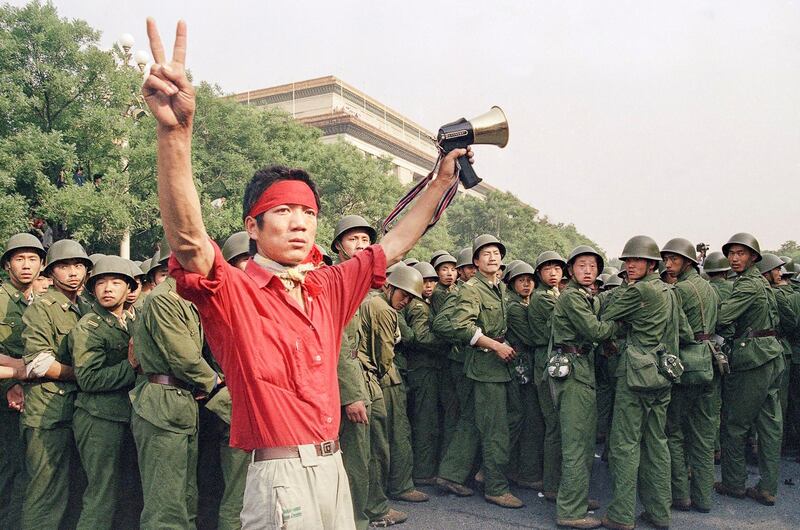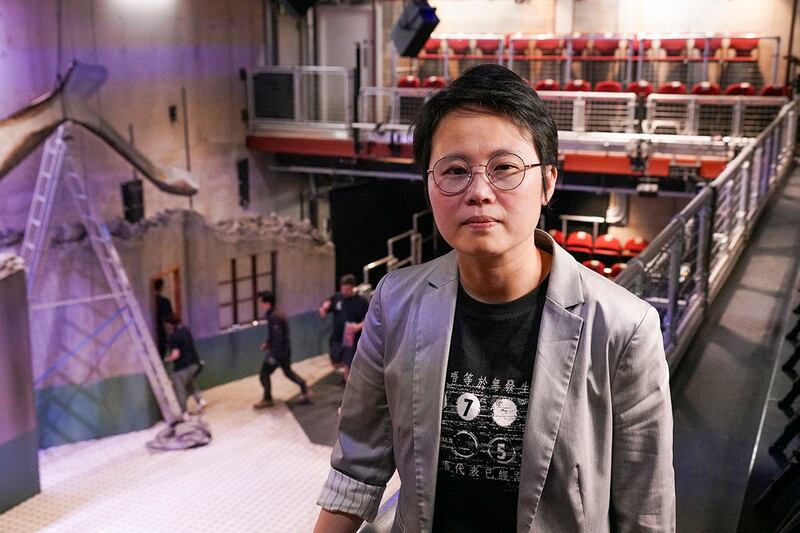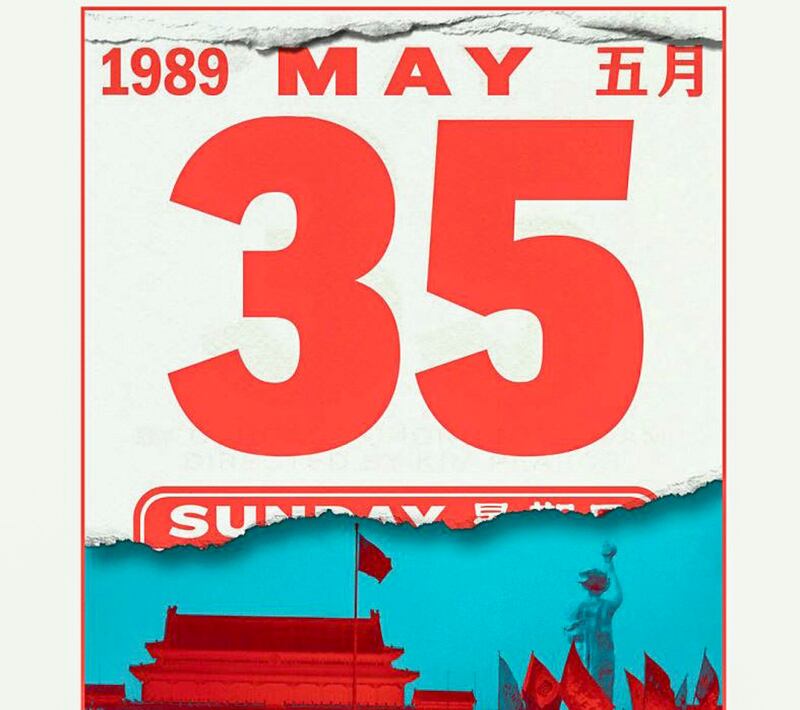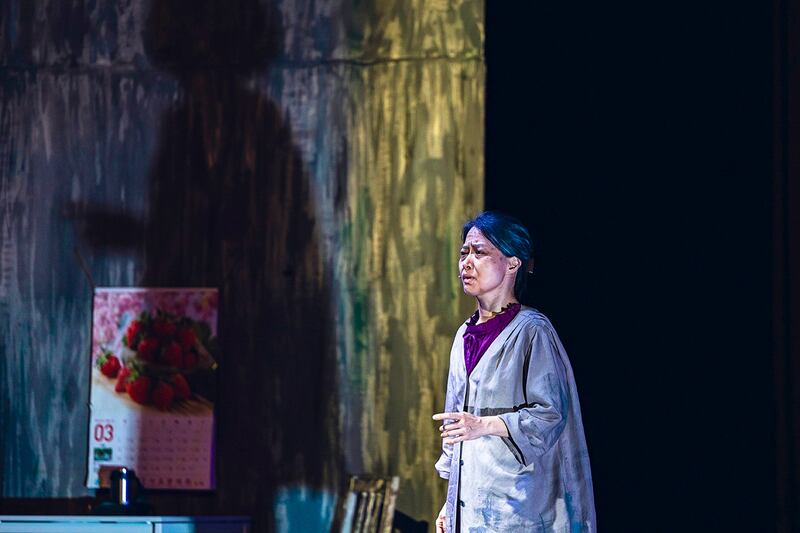A play about the 1989 Tiananmen Square massacre that can no longer be staged in Hong Kong has premiered in London ahead of the 35th anniversary of the bloodshed, in a bid to outrun a widening crackdown on political dissent in the city.
In "May 35th" by Candace Chong, an elderly couple modeled on the real-life families of the victims of the massacre sets out on the night of June 4, 1989, to hold a ritual for their son where he was killed by the People's Liberation Army 35 years ago.
Its title is a reference to a code-word for June 4 used by Chinese internet users to evade censorship by the government.
"You can't call it June 4 -- you have to call it May 35th, which means that it doesn't exist," producer Ming Wai Lit told RFA Mandarin in a recent interview. "[But] we have witnessed history, and we have a responsibility to make the truth known."

Armed with a dated map of Tiananmen Square, a candle and some matchsticks, a cleaner's work permit, and a family secret buried for over 30 years, the couple in the play sets out on their risky mission to honor the life of their son, according to the play's publicity material at London's Southwark Playhouse, which is premiering a recently translated English-language version of the play.
For Lit, the commemoration of the massacre that ended weeks of student-led pro-democracy protests on Beijing's Tiananmen Square and in other cities across China is inextricably bound up with Hong Kong's own pro-democracy movement, and the ongoing crackdown on dissent under two draconian national security laws.
Estimates of death toll for the killing of students and other activists by Chinese tanks and troops in June 1989 range up to 10,000.
The last candlelight vigil
For three decades, thousands of people gathered every June 4 in Hong Kong's Victoria Park to hold a candlelight vigil for the victims, until the gathering was banned in 2020 and its organizers jailed.
"2019 turned out to be the last candlelight vigil in Hong Kong," Lit said in a 2022 interview with RFA Mandarin. "It made me deeply sad that Hong Kong couldn't even accommodate some candles and people mourning."
"The fact that this kind of ritual can no longer happen in Hong Kong shows that there is no going back to the free Hong Kong of the past," she said.

"May 35th" was still being staged in Hong Kong in 2019, but after Beijing imposed the National Security Law on the city in 2020, it became impossible to find a venue.
After the play was performed in front of a live stream audience of more than half a million during the pandemic, there were still security concerns, Lit said.
"On the night of the performance, we were worried that the police would come to our house and that we wouldn't be able to do the live broadcast to the world," she said.
So Lit reached out to human rights lawyer and vigil organizer Chow Hang-tung, who is now in prison awaiting trial under both the National Security Law and the more recent Article 23 security law.
"I got in contact with Tung, who acted as our voluntary legal advisor that night, and stayed till the performance was over. But then she was arrested because of the Alliance," she said in a reference to the now-disbanded vigil organizer, the Alliance in Support of Patriotic Democratic Movements of China.
"Thinking back to that is pretty emotional for me, and also full of irony, because we thought we could use the law to protect ourselves, but now the law is being used as a tool to abuse and harm people," Lit said.
No venues
Lit's production company Stage June Fourth, which is presenting the English version of the play with support from Amnesty International and the U.K.'s Arts Council, was founded in 2009 on the 20th anniversary of the Tiananmen bloodshed.
But it was too risky for it to continue in Hong Kong, she said.

"In 2019, we were still able to legally perform on this theme," Lit told RFA Mandarin as the play opened in London. "We had a good box office and received good reviews from the industry. We won the Best Production, Best Director, Best Screenwriter and Best Lighting Design at the Drama Society Awards that year."
"It is hard to imagine that just five years later, none of these things are possible any more," she said. "It's impossible to find a venue, so it can't be performed."
Even in the United Kingdom, it was hard to find people willing to put their names to the project, Lit said.
"Some people felt uneasy during the selection process, and some decided not to participate after being chosen for the part due to the political risks," Lit said. "So it took a lot of time to confirm the actors."
Even now, none of the three main actors, all of whom have British nationality, is using their real name, she said.
"That was unexpected," Lit said. "I didn't think British actors would have a strong connection with Hong Kong, but because of the National Security Law and the unknown quantity that is Article 23, they didn't know how far-reaching the risks could be."
'Fear is all-pervasive'
Even back in 2022, Lit had noticed that the space for creative expression had gotten smaller in the wake of the first national security law, telling RFA Mandarin at the time that "fear is all-pervasive in the theater industry."

Part of the problem is the vague wording used by the new legislation, and the unwillingness of Hong Kong officials to clarify it in concrete terms.
"You don't know where the lines are drawn, and what used to be a red line in the past is now a sea of red -- the lines are everywhere," Lit said in the earlier interview.
"Even if something was legal before, you don't know if it will become illegal in future."
She said the authorities even then were trying to rewrite the history of Hong Kong's 2019 protest movement, much as they did for the 1989 pro-democracy movement in Tiananmen Square.
"They will tell a different story and completely bury the truth," Lit said, adding that she remains inspired by the play, especially a line in which the elderly bereaved father says before his death: "My son fought for this, even though it didn't succeed. He fought for it anyway."
Here again, Lit sees the parallels with Hong Kong's experience.
"The current situation in Hong Kong is a huge setback, but we tried, and we fought," she said. "Even though we didn't succeed, we fought for it anyway."
Translated by Luisetta Mudie. Edited by Malcolm Foster.
